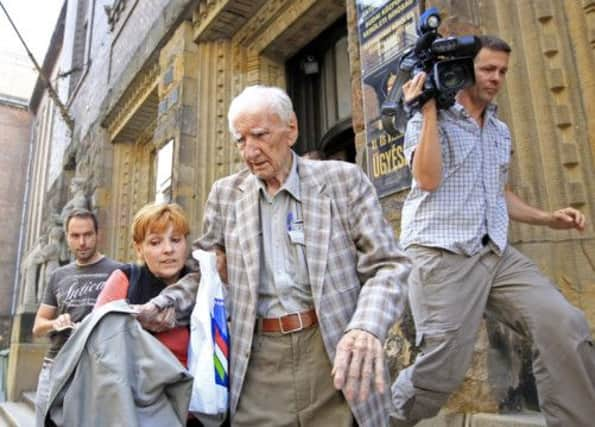Ex-policeman to face accusers in war crime court


They said Laszlo Csatary was the chief of an internment camp for 12,000 Jews at a brick factory in Kosice – a Slovak city then part of Hungary – in May 1944, and that he beat them with his bare hands and a dog whip.
He also allegedly refused to allow ventilation holes to be cut into the walls of a rail freight car crammed with 80 Jewish deportees.
Advertisement
Hide AdAdvertisement
Hide AdWith his actions, Csatary “wilfully assisted in the unlawful execution and torture of the Jews deported from [Kosice] to concentration camps in territories occupied by the Germans,” the prosecution said yesterday.
Csatary, who has denied the charges, was first detained by Hungarian authorities in July 2012 after his case was made public by the Simon Wiesenthal Centre, the Jewish organisation active in hunting down Nazis who have yet to be brought to justice.
Budapest investigative prosecutors’ office spokeswoman Bettina Bagoly said that since Csatary has been charged with war crimes, the case is considered to be of special importance and the first session of the trial must be held within three months.
Ms Bagoly also said that the prosecution has asked the court to tighten the conditions of Csatary’s house arrest, which were loosened by a judge in April.
Csatary lived for decades in Canada and worked as an art dealer before leaving in 1997, just before he was due to appear at a deportation hearing. His Canadian citizenship was revoked.
Ms Bagoly said prosecutors had requested information in the case from Slovakia, Canada and Israel.
Holocaust survivor Edita Salamonova, whose family was murdered in the Auschwitz death camp after their deportation from Kosice, said she remembered Csatary well.
“I can see him in front of me,” Ms Salamonova said in an interview in Kosice last year. “A tall, handsome man but with a heart of stone.”
Advertisement
Hide AdAdvertisement
Hide AdShe remembered Csatary’s presence at the factory, which has since been torn down, and would make sure to keep out of his sight when he was around.
“One had to hide. You never knew what could have happened anytime,” said Ms Salamonova, who was able to return home after enduring several Nazi camps.
Sandor Kepiro, another Hungarian tried for war crimes after his whereabouts was disclosed by the Wiesenthal Centre, died in September 2011, months after being acquitted due to insufficient evidence. The verdict was being appealed when he died.
Though Csatary is expected to go on trial in Hungary, it is also possible that he could be extradited to Slovakia, where he was convicted in absentia in 1948.
In January, a court in Kosice changed the sentence in that case from death to life in prison, since the death penalty is banned in the European Union. That could open the way for his extradition.
Gabor Horvath, who was appointed by the state to defend Csatary, said that his client was in “satisfactory” health and that he expected the trial to go ahead in Hungary.
Lucia Kollarova, a spokeswoman for the Federation of Jewish Communities in Bratislava, the capital of Slovakia, said they wanted Csatary to go to prison in Slovakia.
“We would prefer the war criminal Laszlo Csatary to be extradited to Slovakia,” Ms Kollarova said.
She added that they don’t believe that, given his age, there is “a realistic chance” he would be imprisoned in Hungary.